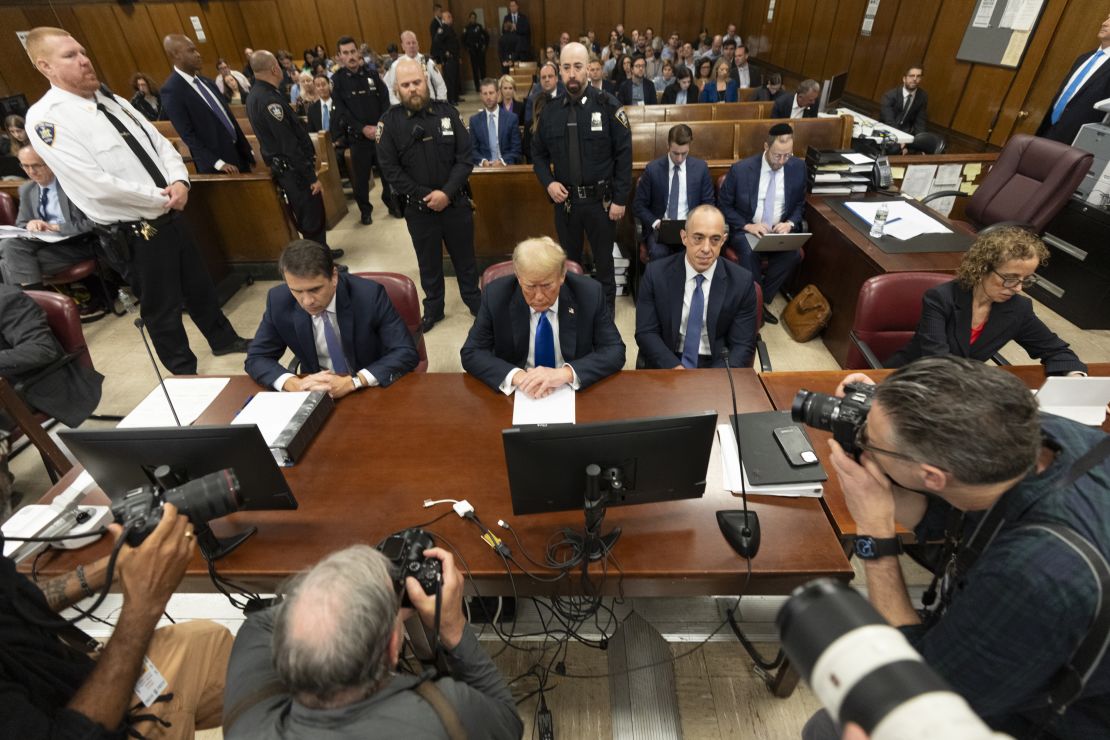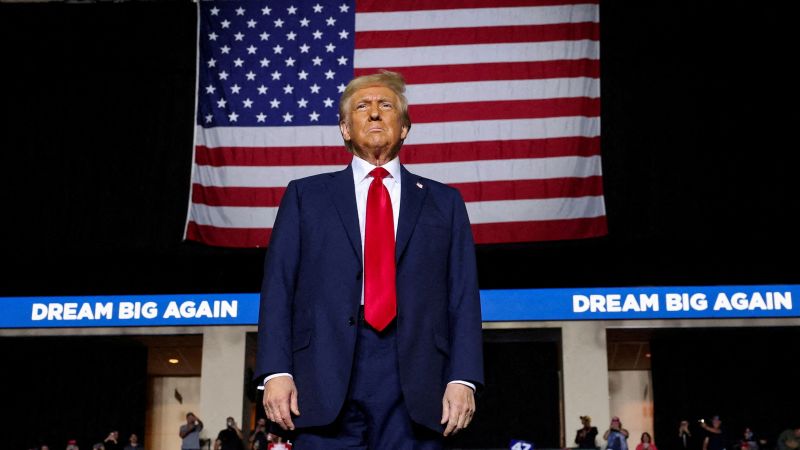CNN
—
Special counsel Jack Smith set out to prove in the United States of America v. Donald J. Trump that even presidents are not above the law.
Instead, his failed prosecutions ended up making Trump even more powerful as the ebullient president-elect prepares to return to office on January 20.
Smith’s decision to bow to the inevitable and shelve his cases over Trump’s alleged election interference and hoarding of classified documents represented a momentous victory for the 45th and 47th president.
The federal elections case led to a Supreme Court ruling granting a president limited immunity for official acts. This is likely to reinforce Trump’s belief that he will have almost unchecked authority and will therefore reverberate through the next four years and generations to come.
And a president – who refused to accept the will of voters, the bedrock principle of democracy, after he lost an election and then told supporters to “fight like hell” before they invaded the US Capitol – will pay no lasting legal price.
Smith, in his downbeat legalese, sketched the enormity of America’s reality.
“The Department and the country have never faced the circumstance here, where a federal indictment against a private citizen has been returned by a grand jury and a criminal prosecution is already underway when the defendant is elected President.” He added that Justice Department policy means the case cannot go ahead because the Constitution prohibits the indictment or prosecution of sitting presidents. But he also made clear that the outcome is not “based on the merits or strength of the case against the defendant.”
In other words, voters have elected a president under federal criminal indictment even though he is still accused of one of the most serious crimes against democracy in American history. Trump has pleaded not guilty to all charges against him.
And by voting the way they did, Americans effectively exonerated him in the federal cases — on charges that could have landed him in jail. Ironically, the very democracy that Trump had tried to subvert produced his legal deliverance.
The cases were doomed anyway since Trump vowed to fire Smith as soon as he takes office.
But Smith’s move on Monday validated Trump’s high-wire legal and political strategy, which involved repeated delays, sometimes with the help of conservative judges, and an absolute imperative to win the presidential election — a feat that looked unlikely when he was first charged.
There will be short- and long-term consequences from Trump escaping accountability.
His second term, which he already pledged to devote to “retribution,” has the potential to unfold in an even greater atmosphere of impunity than his first one. After all, Trump enters office for the second time having seen that his method of testing the rule of law to its limits had little downside, aside from the symbolism of his second impeachment by the US House.
“For Donald Trump, his strategy of delay, delay, delay and then win the election to do away with the litigation, proves to be one of the ultimate success stories,” James Sample, a law professor at Hofstra University, told Julia Chatterley on “First Move” on CNN International. “It’s certainly a win in terms of avoiding accountability, which means it is a loss for the rule of law that it took so long to bring these cases to trial that they never in fact got to trial before the election.”
Smith’s inability to bring the president-elect to account — for the most flagrant attack on the integrity of elections of modern times — will also echo down the ages.
Many Republicans are convinced by now that Trump was unfairly targeted. But some future president, decades from now, might decide to meddle in the result of an election that they lost in the knowledge that a predecessor got away with it.
In Washington, Judge Tanya Chutkan, who was set to preside over the political trial of the century in the federal election interference case, quickly agreed to Smith’s request to dismiss the case without prejudice — meaning that theoretically Trump could face the same charges again when he leaves office. But the chances of a revival of the trial in four years are far-fetched, even if a Democrat is in the White House.
The folding of the federal prosecutions also poses searching questions for Smith and the Justice Department.
Democrats have long complained that Attorney General Merrick Garland waited too long to appoint a special counsel to investigate Trump for his election meddling in 2020. After all, a congressional select committee under the previous Democratic House majority spent months probing the issue. The case might have come to trial had Garland moved more quickly. Certainly, there would have been more time for Supreme Court appeals to play out that Democrats thought were tainted by politicized delaying tactics by the conservative majority.
There has all along been another profound consideration hanging over the case. Despite the horror of what unfolded on January 6, 2021, and the shock of a president using his vast powers to try to steal an election he lost, a decision to prosecute was always going to rock the nation and its tortured politics.
Smith followed the evidence where he thought it led and secured indictments through grand juries who were convinced there was probable cause that criminal activity had occurred in both cases. That is standard prosecutorial practice.
But even some legal scholars sympathetic to the idea that Trump should face accountability for trying to overturn an election wondered whether the legal theories on which Smith relied were somewhat novel. But how could they not be? No president before dared to do what Trump tried.
And the business of putting a former president on trial was always going to raise a more acute dilemma: Was it really in the national interest to try to bring a former commander in chief into a courtroom trial, given the tumult such a crossing of the historic Rubicon was always destined to cause?
At the same time, however, failing to act against an attempt to steal an election and the alleged unauthorized storage of classified documents would have enshrined an un-American principle that presidents can break the law but every other citizen cannot.
It was not Smith’s job to consider the political implications of his indictments. But charging Trump in two separate cases ahead of the election year, when the ex-president was already a candidate, was always going to stoke partisan uproar. There’s a good argument that this course revived Trump’s political career.
The impact of the two federal cases — and two other prosecutions in a hush money case in New York, in which Trump was convicted, and another election interference matter in Georgia that is still awaiting trial — was to unify the Republican Party around Trump in the primary. By the general election, millions of Republican voters bought his argument that he was not only innocent but was effectively a dissident persecuted by a weaponized justice system. “I’m being indicted for you,” he had said.

Perhaps Smith’s cases would have been less politically radioactive had Trump not also faced multiple other cases. Trump’s mug shot in the Georgia matter, for example, was a galvanizing moment for his supporters. And the spectacle of FBI agents searching his Florida club for classified documents provided a powerful image for a former president who declared he was unfairly prosecuted.
The once-and-future president put the cap on his reality warping narrative that he was the victim, rather than the perpetrator, of election interference. “It was a political hijacking, and a low point in the History of our Country that such a thing could have happened, and yet, I persevered, against all odds, and WON. MAKE AMERICA GREAT AGAIN!,” Trump wrote on Truth Social on Monday.
Four years ago, a nation sickened by a once-in-a-century pandemic was being put through another ordeal because of one man’s inability to face up to the fact that he lost the 2020 general election.
So, it’s worth going back to Smith’s original indictment to recall the grave and unprecedented conduct that was charged in the election interference case and for which Trump will now almost certainly not be held accountable.
“The Defendant lost the 2020 presidential election,” Smith wrote. “Despite having lost, the Defendant was determined to remain in power. So, for more than two months following election day on November 3, 2020, the Defendant spread lies that there had been outcome-determinative fraud in the election and that he had actually won. These claims were false, and the Defendant knew that they were false. But the Defendant repeated and widely disseminated them anyway—to make his knowingly false claims appear legitimate, create an intense national atmosphere of mistrust and anger, and erode public faith in the administration of the election.”
Even Trump’s own Justice Department ruled that there was no meaningful fraud in the 2020 election that would have altered the result. Almost all of Trump’s legal challenges failed, and Joe Biden was duly inaugurated, two weeks after his predecessor’s crowd tried to halt the congressional certification of his victory.
Rep. Dan Goldman, a New York Democrat who served as a lead counsel in Trump’s first impeachment trial, said he understood why Smith had followed Justice Department guidance. But he also portrayed Trump’s evasion of a trial as a dark day for America. “I think this is a shame for justice in this country. It establishes that Donald Trump is above the law,” he told CNN’s Boris Sanchez.
Trump will prove that assessment in less than two months on the West Front of the Capitol, when he swears to “preserve, protect and defend the Constitution of the United States” on the ground over which his mob swarmed on January 6, 2021.

